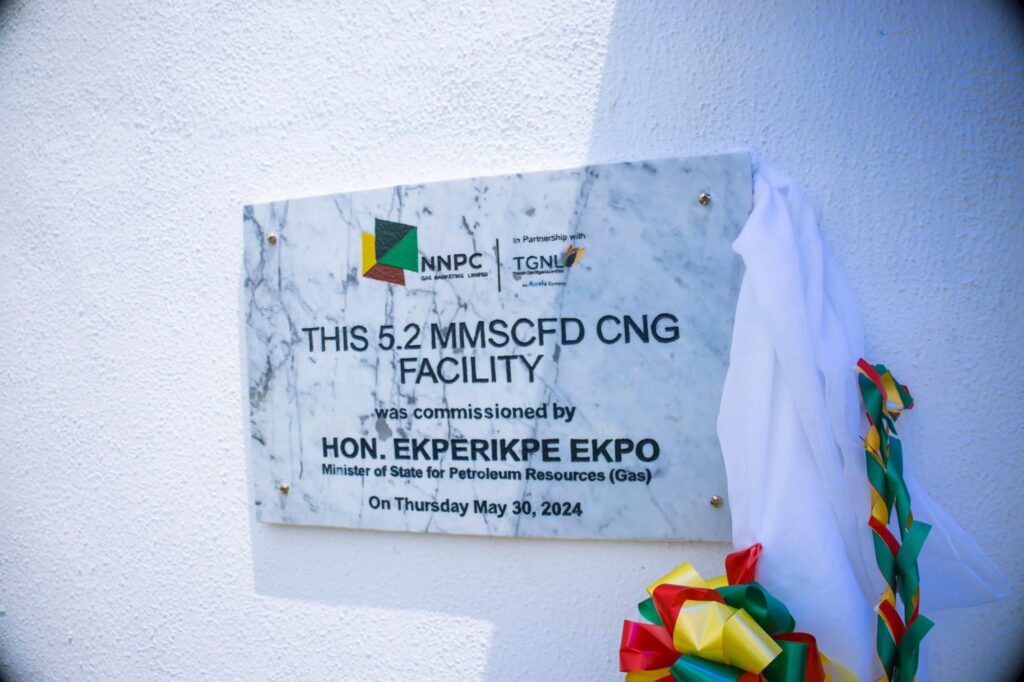On Thursday, May 30, Nigeria’s Minister of Petroleum Resources (Gas), Ekperikpe Ekpo, commissioned a 5.2 million standard cubic feet per day (mmscfd) Compressed Natural Gas (CNG) plant in the Isolo Industrial Area, Ilasamaja, Lagos State. He commissioned the project at an event themed “From Gas to Prosperity: CNG for All,” which marks a significant milestone in advancing affordable, sustainable, and secure energy in Nigeria.
Ekpo highlighted 2024 as a pivotal year for Nigerians, emphasizing that President Bola Tinubu’s bold move to eliminate fuel subsidies and promote Liquefied Petroleum Gas (LPG) has ushered in a new era of opportunities.
“The removal of the Premium Motor Spirit (PMS) subsidy, despite its challenges, has presented us with a unique opportunity to innovate and adopt more economical, efficient, and sustainable energy alternatives,” stated Ekpo.
Ekpo said that using gas as a transport fuel is a globally established technology known for its clean-burning properties, significantly reducing nitrogen and soot emissions. He pointed out that compressed natural gas-powered passenger vehicles emit 5-10% less CO2 than their gasoline counterparts, making it a viable option for powering cars and city buses.
Nationwide expansion plans
Mele Kyari, NNPC Limited‘s Group Chief Executive Officer (GCEO), said the company has finalized a Final Investment Decision (FID) with Axxela Limited. This collaboration aims to deliver six CNG mother and service stations, each with a 5.2 mmscfd capacity, strategically located across Nigeria’s six geopolitical zones, including the Federal Capital Territory (FCT), to facilitate bulk CNG access.
Additionally, NNPC Retail is set to deploy CNG across over 100 stations nationwide, supported by other Joint Venture (JV) partnerships. Kyari emphasized that the commissioning of the NNPC CNG Station in Ilasamaja is part of NNPC’s broader strategy to enhance domestic gas supply and utilization by expanding gas infrastructure across the country.
“NNPC will continue to deliver more strategic projects for our country’s benefit. We shall harness our gas resources for industrialization, power generation, and economic prosperity,” Kyari affirmed.

CNG Plans in Lagos
Lagos State Governor Babajide Sanwo-Olu praised the CNG plant’s establishment, aligning it with his administration’s vision for economic growth, job creation, and industrialization in Lagos. He announced that the State Government plans to deploy 2,500 conversion kits and over 2,000 new compressed natural gas buses to begin operations by year-end, demonstrating a strong commitment to promoting its utilization across the state.
In his goodwill message, Engineer Michael Oluwagbemi, Director of the Presidential CNG Initiative, lauded the plant’s commissioning as a testament to President Tinubu’s dedication to providing sustainable energy solutions for Nigerians.
The flip side
Nigeria currently has a limited number of Compressed Natural Gas consumers, raising questions about the federal government’s emphasis on the fuel. According to Michael Oluwagbemi, the country has only 30 active CNG refuelling stations. An additional 30 stations are under construction and expected to be operational by July 31, 2024.
The infrastructure for CNG conversion and refuelling is still in its nascent stages. Presently, there are only 141 conversion workshops across the nation. This limited infrastructure poses a significant challenge to the widespread adoption of CNG as a viable alternative to petrol.
CNG availability is unevenly distributed across Nigeria. Out of the 36 states, only 23 have access to CNG, primarily concentrated in the southern regions. This regional imbalance raises concerns about the practicality and economic viability of CNG replacing petrol as the primary fuel for commercial and transportation purposes nationwide.
The uneven distribution and limited infrastructure cast doubt on the feasibility of CNG as a mainstream fuel alternative. A more robust and widespread network of refuelling stations and conversion workshops is essential for CNG to compete effectively with petrol.
While the federal government’s push towards CNG aims to provide a cleaner and more sustainable fuel option, significant challenges remain. Addressing the infrastructure deficit and geographical disparities is critical to becoming a viable alternative to petrol in Nigeria’s commercial and transportation sectors.
On the global front
Times of India reports that Bajaj Auto is gearing up for the much-anticipated launch of its CNG-powered motorcycle on June 18, 2024. Rajiv Bajaj, Bajaj Auto’s managing director, recently confirmed the motorcycle’s imminent arrival to cater to cost-conscious customers amidst rising fuel prices.